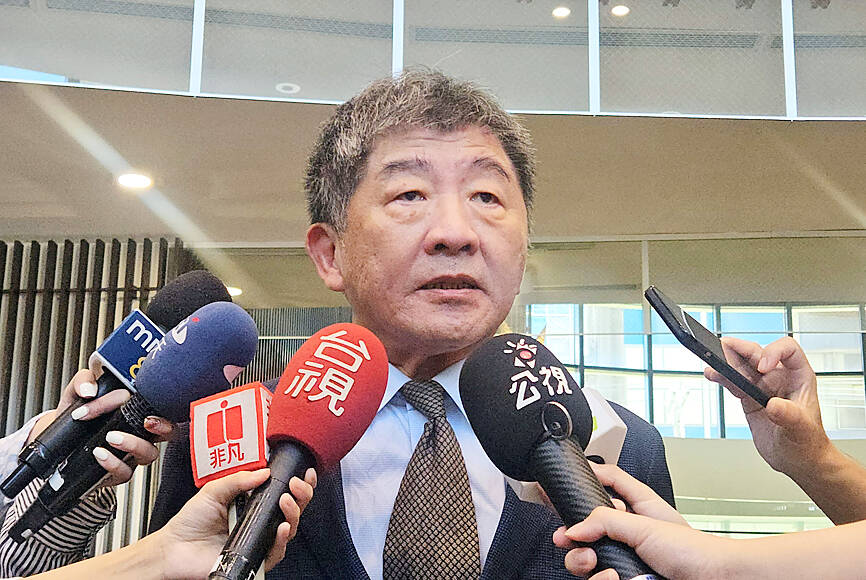The government is dedicated to improving the nation’s low birthrate and plans to offer a monthly baby bonus are being discussed, Premier Cho Jung-tai (卓榮泰) said yesterday morning, adding that a report that the monthly incentive would be set at NT$30,000 (US$913) is not final.
Minister Without Portfolio Chen Shih-chung (陳時中) said in an interview published yesterday in the Chinese-language United Daily News that the government is formulating a birth subsidy program that would provide a monthly bonus of about NT$30,000 for each baby until they reach kindergarten age.
When asked about Chen’s proposal, Cho said during a visit to Pingtung County that the government has continued to invest in solutions to solve the birthrate problem, such as offering more public childcare services, while the birth subsidy program is being planned.

Photo: CNA
“I requested Minister Chen to gather information and conceive an initial plan based on reasonable calculations — not that we could come up with an exact number immediately,” he said.
A monthly bonus of NT$30,000 is an estimate that needs further discussion, he added.
The goal of the birth subsidy is to encourage young people to have children without being burdened by financial concerns, but the government “has yet to reach the stage” of finalizing the exact amount of the subsidy and its implementation timeline, the premier said.
In the interview, Chen said that many Taiwanese dare not have children due to concerns over the financial burden.
While the government’s subsidy policies used to be indirect, a larger baby bonus remitted directly to personal bank accounts could incentivize people to have more children, he was quoted as saying in the interview.
For example, Hungary used to have a sub-replacement fertility rate of 1.1, but this has risen to 1.6 in recent years after a cash subsidy went into effect, he said.
The Healthy Taiwan Promotion Committee estimates that a monthly bonus of NT$30,000 for each of the approximately 130,000 newborns each year would result in a monthly expenditure of NT$3.9 billion or require an annual budget of nearly NT$50 billion, he said.
The amount is seemingly massive, but still less than one-fourth of the recommended amount for childcare subsidies, which should be NT$200 billion in Taiwan, making up 2 percent of GDP, it reported Chen as saying.
Meanwhile, Minister of Health and Welfare Chiu Tai-yuan (邱泰源) yesterday said that any proposal that helps implement the government’s childcare policy is worth discussing.
Democratic Progressive Party Legislator Lin Yueh-chin (林月琴) said that generous birth subsidies could help boost the birthrate, as many of her female acquaintances have said they are willing to have children if the monthly baby bonus is set at NT$30,000.
Aside from the cash subsidy, providing high-quality kindergartens and infant care centers are also important, so that parents could go to work without worries, she said.

A car bomb killed a senior Russian general in southern Moscow yesterday morning, the latest high-profile army figure to be blown up in a blast that came just hours after Russian and Ukrainian delegates held separate talks in Miami on a plan to end the war. Kyiv has not commented on the incident, but Russian investigators said they were probing whether the blast was “linked” to “Ukrainian special forces.” The attack was similar to other assassinations of generals and pro-war figures that have either been claimed, or are widely believed to have been orchestrated, by Ukraine. Russian Lieutenant General Fanil Sarvarov, 56, head

SAFETY FIRST: Double the number of police were deployed at the Taipei Marathon, while other cities released plans to bolster public event safety Authorities across Taiwan have stepped up security measures ahead of Christmas and New Year events, following a knife and smoke bomb attack in Taipei on Friday that left four people dead and 11 injured. In a bid to prevent potential copycat incidents, police deployments have been expanded for large gatherings, transport hubs, and other crowded public spaces, according to official statements from police and city authorities. Taipei Mayor Chiang Wan-an (蔣萬安) said the city has “comprehensively raised security readiness” in crowded areas, increased police deployments with armed officers, and intensified patrols during weekends and nighttime hours. For large-scale events, security checkpoints and explosives

A magnitude 7.0 earthquake struck off Yilan at 11:05pm yesterday, the Central Weather Administration (CWA) said. The epicenter was located at sea, about 32.3km east of Yilan County Hall, at a depth of 72.8km, CWA data showed There were no immediate reports of damage. The intensity of the quake, which gauges the actual effect of a seismic event, measured 4 in Yilan County area on Taiwan’s seven-tier intensity scale, the data showed. It measured 4 in other parts of eastern, northern and central Taiwan as well as Tainan, and 3 in Kaohsiung and Pingtung County, and 2 in Lienchiang and Penghu counties and 1

‘POLITICAL GAME’: DPP lawmakers said the motion would not meet the legislative threshold needed, and accused the KMT and the TPP of trivializing the Constitution The Legislative Yuan yesterday approved a motion to initiate impeachment proceedings against President William Lai (賴清德), saying he had undermined Taiwan’s constitutional order and democracy. The motion was approved 61-50 by lawmakers from the main opposition Chinese Nationalist Party (KMT) and the smaller Taiwan People’s Party (TPP), who together hold a legislative majority. Under the motion, a roll call vote for impeachment would be held on May 19 next year, after various hearings are held and Lai is given the chance to defend himself. The move came after Lai on Monday last week did not promulgate an amendment passed by the legislature that